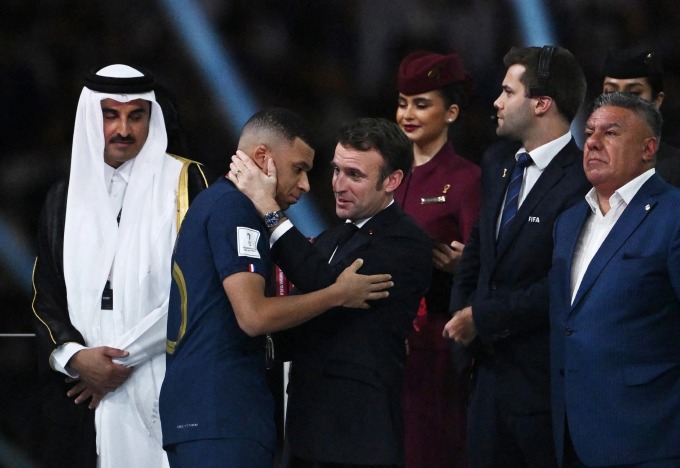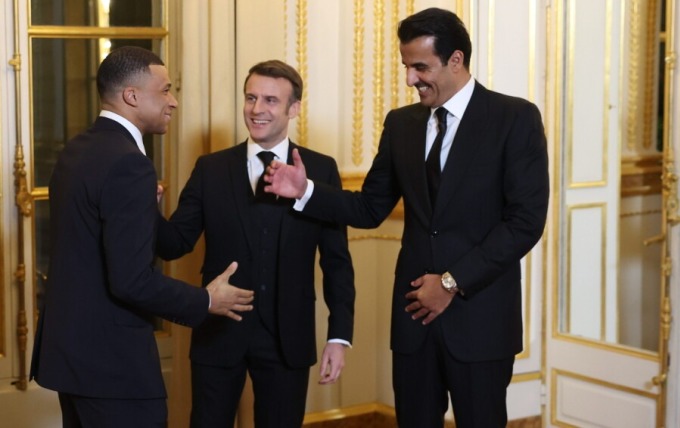The attendance of Kylian Mbappe alongside political figures at a state banquet underscores the expanding influence of the footballer beyond the realm of sports.
Nearly two years have passed since French President Emmanuel Macron secured victory in his second-term election, defeating far-right rival Marine Le Pen with over 58% of the vote. However, in Tallenay, a small town in eastern France, 10 voters expressed complete disillusionment with the choice between Macron and Le Pen. Instead, they spoiled their ballots by inscribing the name of Kylian Mbappe, the French national team player and forward for PSG. While this action may seem an unconventional form of protest, it has garnered nationwide attention and marked Mbappe’s presence in French public life.
In the political sphere, Mbappe also stands out as a prominent figure. Just last week, the 25-year-old athlete was a guest at a dinner hosted by Macron at the Elysee Palace in Paris, during the visit of Qatar’s Emir Sheikh Tamim bin Hamad Al Thani. Qatar is the practical owner of PSG, a club under the control of the Qatar Sports Investments Fund established by the Emir in 2005. However, Mbappe dining with the French President and the Emir, alongside former French President Nicolas Sarkozy and other key figures, including billionaire Bernard Arnault – France’s wealthiest individual, underscores another dimension of the player’s influence. The personal welcome extended by Macron and the Emir indicates both leaders’ desire to portray Mbappe’s image for their respective nations.
According to The Athletic, Macron has long recognized the value of sports in leadership. He understands that sports can serve as a tool for unity in a nation overshadowed by protests against pension reform.
During his first election campaign in 2017, he pledged to promote sports. He also demonstrated astuteness by associating his personal image with sporting success to enhance interaction with certain voters. Last summer, Macron shared a beer in 17 seconds with members of France’s championship rugby team, Toulouse. He also often speaks of supporting the Marseille football club. Cheering for the French team, fans cannot forget Macron’s image celebrating France’s victory in the 2018 World Cup, performing the “Dab” dance with Paul Pogba in the locker room, and consoling Mbappe after the defeat in the 2022 World Cup final.
`
According to Jean-Baptiste Guegan, a French political geographer and author of “The Mbappe Revolution,” the relationship between Macron and Mbappe exemplifies the politicization of football in France.
“Mbappe has the ability to increase attention around the France-Qatar summit and add dynamism to the prestigious state dinner. At that moment, he leaves his mark on the relationship between the two countries,” Guegan said.
Qatar’s acquisition of PSG for $76 million in 2012 was not only an investment project (PSG’s value has now risen to nearly $5 billion), but also an opportunity to develop international image, political, and geopolitical leverage. According to Guegan, by acquiring PSG and rescuing French football through beIN Sports television, Qatar has become closer to France, a European powerhouse with a defense industry and a seat on the UN Security Council.
“Such investment is very useful given Qatar’s complex geopolitical situation in the Middle East and strengthens the historical ties between the two countries,” Guegan added. “And finally, this position brings important economic opportunities to Qatar. Relationships forged through connections at the stadium allow Qatar to invest more in Paris and consolidate its position.”
The relationship between France and Qatar was solidified in February when the two countries signed a strategic partnership agreement. Under the agreement, Qatar agreed to invest over $10 billion in startups and investment funds in France from 2024 to 2030. There are few signs that Mbappe leaving PSG would tarnish this relationship.
In the first decade of controlling PSG, Qatar focused on a star-studded strategy to attract attention. They signed contracts with many famous names, including David Beckham, Zlatan Ibrahimovic, Neymar, Mbappe, and Lionel Messi. According to some critics, this was to divert attention from questions about how Qatar won the hosting rights for the 2022 World Cup (although they always denied wrongdoing) and subsequently the workforce to build infrastructure for the tournament.
In June 2017, the Saudi-led alliance, with support from the UAE, Bahrain, and Egypt, presented 13 demands to Qatar, accusing it of sponsoring terrorism and destabilizing the region. When Qatar rejected these demands, borders were sealed, airspace was restricted, and diplomatic ties were cut. For over three years, relations reached a record low.
Also in the summer of 2017, PSG made a big splash in the transfer market by signing Neymar from Barca for a world record $263 million and later sealing a deal with Mbappe from Monaco.
According to Kristian Ulrichsen, a Middle East researcher at Rice University’s Baker Institute for Public Policy (USA), Qatar’s investment has gone beyond football. “The Neymar deal certainly made a statement that Qatar is not isolated by the blockade. The initial purpose of the Saudi-led coalition was to isolate Qatar and prove that the world was not ready to engage with Qatar, but then Qatar suddenly paid the world record fee, demonstrating that they were doing well despite the blockade, and people didn’t believe the Saudi narrative,” Ulrichsen said.
At the age of 18, Mbappe signed a contract as a promising star for PSG. His profile at that time was much thinner compared to Neymar’s, but within a year, Mbappe led France to win the World Cup in Russia, and PSG had a superstar on their hands.
As the 2022 World Cup approaches, having a roster of big names owned by Qatar-sponsored clubs is a source of pride. PSG retains Neymar and adds Messi, but the biggest effort is still mobilizing all their strength to keep Mbappe from the lure of Real Madrid. Not only Qatar, but also French organizations and individuals are involved. According to Guegan, President Macron, former President Sarkozy, and Paris Mayor Anne Hidalgo all advised the “number 7” to stay. Officials from the French Football Federation, Ligue 1, the National Olympic Committee, PSG players, and other politicians from the Ministry of Sports also persuaded Mbappe to stay at least until the 2024 Olympics, an event the 25-year-old forward is expected to represent his country in August. As a result, Mbappe agreed to stay until 2024.
Why is Mbappe so important and agreeable to the President of France? Guegan explains: “They share a trajectory, are young compared to their peers, and are winners. They are also dynamic, stand out individually, and develop early. Mbappe has learned a lot from Macron and is drawn to politics, power, and the world. Macron is a politician who loves football.”
When news of Mbappe’s transfer to Real Madrid from the summer emerges, his influence in Paris and France temporarily diminishes. Sometimes, he faces criticism from fans right at Parc des Princes. However, he may continue to elevate the reputation of France if successful at Real Madrid, winning gold at the 2024 Olympics or the 2026 World Cup. This would be another opportunity for President Macron to celebrate, or at least congratulate, his young friend.


